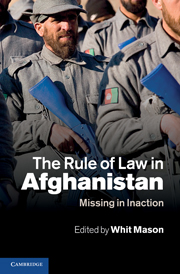Book contents
- Frontmatter
- Contents
- Contributors
- Preface and acknowledgements
- 1 Introduction
- PART I The scope and nature of the problem
- PART II The context
- 4 The international community's failures in Afghanistan
- 5 The rule of law and the weight of politics
- 6 Human security and the rule of law
- PART III The political economy of opium
- PART IV Afghan approaches to security and the rule of law
- PART V International interventions
- PART VI Kandahar
- PART VII Conclusion
- Index
4 - The international community's failures in Afghanistan
Published online by Cambridge University Press: 01 June 2011
- Frontmatter
- Contents
- Contributors
- Preface and acknowledgements
- 1 Introduction
- PART I The scope and nature of the problem
- PART II The context
- 4 The international community's failures in Afghanistan
- 5 The rule of law and the weight of politics
- 6 Human security and the rule of law
- PART III The political economy of opium
- PART IV Afghan approaches to security and the rule of law
- PART V International interventions
- PART VI Kandahar
- PART VII Conclusion
- Index
Summary
It is becoming painfully obvious that the objectives that some of us diplomats and perhaps key member states of the international community were pursuing in Afghanistan after September 11, 2001, and which most Afghans were yearning for, will fail to be achieved. This is in spite of the enormous investment of lives and money since 2001. This disparity between investment and achievement demands explanation.
In seeking to explain our failures, it has been tempting for some to claim that what we had set ourselves to achieve was overly ambitious, that Afghanistan was never going to become ‘another Switzerland’ (as if that was what we were aiming at). This line argues that it was a mistake to attempt to ‘impose’ a Western style of governance on what had always been a tribal society devoid of governmental, let alone representative, institutions.
But this critique, however comforting to us, ignores Afghanistan's history. Between 1919 and the end of the 1970s, Afghanistan had civilian institutions both at the centre and in the regions, including the period 1963 to 1973 when parliament was elected by universal suffrage with a government responsible to it. Describing Afghanistan as a hopeless case further overlooks the fact that Afghanistan is a multi-ethnic society, that the tribal system only functioned in the areas inhabited by the Pashtun, and that, in the course of years of conflict, the authority of tribes, elders and jirgas (dispute-resolving bodies made up of all adult men in a group) has been eroded.
- Type
- Chapter
- Information
- The Rule of Law in AfghanistanMissing in Inaction, pp. 53 - 60Publisher: Cambridge University PressPrint publication year: 2011
- 1
- Cited by



